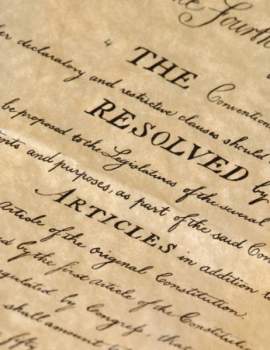
Chicago Milwaukee & St. Paul Railway Company v. Minnesota

Chicago Milwaukee & St. Paul Railway Company v. Minnesota: The Background
The case of Chicago Milwaukee & St. Paul Railway Company v. Minnesota was a landmark Supreme Court decision which held that procedural due process limits the state’s regulatory powers concerning price alterations to railroad rates.
The case of Chicago Milwaukee & St. Paul Railway Company v. Minnesota begins with a regulatory agency in Minnesota who had set railroad rates that the state’s Supreme Court had refused to alter or overturn. The United States Supreme Court ruled that these rates were established without due process of law. Specifically, the United States Supreme Court found that the rates were put in place without an opportunity to challenge the reasonableness and equality of the charges. In essence, the United States Supreme Court ruled that the Minnesota court had permitted rate-setting without any judicial hearing or any requirement of witnesses or notice.
In Chicago Milwaukee & St. Paul Railway Company v. Minnesota, the United States Supreme Court rejected the railroad’s argument that the state’s contact with the local railroad line, as it existed in state-chartered companies that the railroad later purchased, remained in force against state ordinance. Instead, they ruled that the state’s right to regulate industries could not be forfeited except by explicit declarations of law. That said, this issue was included by the court’s wider decision concerning due process.
The case of Chicago Milwaukee & St. Paul Railway Company v. Minnesota was argued on January 13th and 14th of 1890. The decision by the United States Supreme Court in Chicago Milwaukee & St. Paul Railway Company v. Minnesota was decided on March 24th 1890. The courts in Chicago Milwaukee & St. Paul Railway Company v. Minnesota held that the procedural due process clause applies to state regulatory action.
Chicago Milwaukee & St. Paul Railway Company v. Minnesota: The Decision
The Chief Justice for the United States Supreme Court in Chicago Milwaukee & St. Paul Railway Company v. Minnesota was Melville Fuller. The ruling of Chicago Milwaukee & St. Paul Railway Company v. Minnesota was regarded as an application of the principle that the court determines the Constitution’s allocation of power among the branches of government, but not the discretionary exercise of said powers.
In a 6 to 3 vote, the United States Supreme Court in Chicago Milwaukee & St. Paul Railway Company v. Minnesota found that the establishment of rate-setting and the practice of a warehouse commission to fix rates is in direct violation of due process.



















